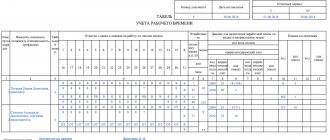Home / Personnel selection / Interview
Back
Reading time: 6 min
0
14
Refusal is one of the unpleasant moments in the work of any HR employee. Many HR managers avoid this routine, so candidates remain in the dark for a long time. According to leading experts, it is better to send a template letter than to ignore such a matter. As a result, the question arises of how to refuse to hire an applicant so that this does not affect his self-confidence and incentive to search for work.
Often a template letter is sent to refuse.
- 1 Is the employer obliged to provide an answer?
- 2 Terms of legal refusal
- 3 What reasons are considered legitimate?
- 4 Unconditional candidates
- 5 Illegal refusal by the employer
- 6 How to reject a candidate from the employment center
- 7 Drawing up a correct refusal
- 8 Ways to report a refusal
Is the employer required to respond?
It is necessary to refuse the candidate and applicant after the interview if he does not meet the requirements in a timely manner. You shouldn’t avoid it by any means and put it off until the last minute. Communicating results politely and tactfully shows respect for the citizen and the culture of the organization.
The relationship with each applicant should be in the nature of cooperation, because the next time he will come to the company as a client or will speak positively to his boss of some leading organization. But this will happen if the applicant has positive impressions from the interview. Otherwise, a dissatisfied candidate may leave a negative review about the company on the Internet.
Terms of legal refusal
The law does not establish exact deadlines for a response.
There are no exact deadlines for refusing an applicant.
In order not to keep the applicant waiting for the outcome of the interview, it is worth setting a time frame for providing an answer. It is not necessary to specify an exact date, because Most often, the decision to hire a new employee is made by several specialists. The main thing is to keep your promise.
If the HR manager said that the results would be available within a week, but no decision was made, then he is obliged to contact the applicant and warn about the delay.
If there is no agreement, the refusal to hire must be reported immediately as soon as a new employee is selected. The candidate is in a stressful situation, so it is not recommended to make him wait for a long time, he is in the dark. A conscientious organization correctly reports the result no later than 14 days from the last meeting.
Delaying a response can have a negative impact on the company's reputation.
Sometimes during an interview, it becomes clear to a HR specialist that the applicant is not suitable for an open vacancy. In order not to waste time in the future notifying such applicants, you can inform them after the interview that in case of a positive result, an employee will contact him by phone within 3 days. This option will give the applicant an accurate idea of the time frame for receiving a response and the method of communication.
How to refuse a job correctly
After the interview, you must inform the applicant about the refusal. To begin with, by phone.
The person is waiting and worried - so choose the softest wording of the refusal. For example, like this:
“Unfortunately, you were not selected, but we will save your information in the applicant database and will keep you in mind if a vacancy becomes available.”
Sometimes a candidate suspects that he was rejected unlawfully and requests a written refusal. This request is completely legal, and you are obliged to send a response within 7 working days of receipt.
The written refusal is called a “Notice of Denial of Employment.” Carefully consider the rationale for refusal. Win-win option - “Education/qualifications/experience do not meet the requirements.”
To refuse due to non-compliance with the requirements, you must have job descriptions or an order establishing requirements for a candidate for a vacant position. Specify the requirements for the employee in as much detail as possible in the vacancy, indicate the required education, work experience, and additional qualifications.
Commentary by GorodRabot.ru lawyer Yuri Kozhinov
Universal, in my opinion, is a refusal to hire due to the “inconsistency of the employee’s business qualities with the vacant position.” This reason is almost impossible to challenge in court.
Thus, in paragraph 10 of the Resolution of the Plenum of the Supreme Court of the Russian Federation dated March 17, 2004 No. 2 “On the application by the courts of the Russian Federation of the Labor Code of the Russian Federation” it is explained that:
- Concluding an employment contract with a specific job seeker is a right, not an obligation, of the employer
- The employer... independently, under his own responsibility, makes the necessary personnel decisions
- If the court finds that the employer refused to hire due to circumstances related to the business qualities of the employee, such refusal is justified
- An employer has the right to impose other requirements on a person applying for a vacant position or job... (for example, knowledge of one or more foreign languages, ability to work on a computer)
What reasons are considered legitimate?
According to Art. 64 of the Labor Code of the Russian Federation, refusal to work must be justified and related to the professional qualities of the employees. They mean the ability to perform job duties, taking into account the existing qualifications and personal qualities of the employee.
If, after the refusal, the applicant expressed a request to receive a written justified refusal, then the organization’s employees are required to comply with this by law. If a citizen is not satisfied with the answer received, he can appeal to the court. The employer needs to indicate exact requirements in the vacancy, and in a written response about a negative decision, record the reason, referring to the employee’s business qualities.
For example, you can inform the applicant that a candidate with more work experience was selected. According to regulations, only such a sample answer will be a legal justification.
The following reasons are also valid:
- presence of medical contraindications;
- mismatch of qualifications;
- lack of required position.
A legitimate justification may be the presence of medical contraindications.
Reasons for a negative decision on a candidate
It is necessary to voice the reason for refusal to the applicant after the interview only if the candidate has asked for it. These may be professional qualities that the employer did not like, behavioral issues, and others. However, officially only an employee’s business qualities can be the reason for refusal (Article 3 of the Labor Code of the Russian Federation). Of course, in practice, a candidate may not be suitable due to other parameters (external, gender). So, the reasons why a negative decision is often made on an applicant are the following:
- High demands of the candidate. An employee may demand a salary that is an order of magnitude higher than what the employer is willing to offer. In rare cases, increased payment is possible (we are talking about specialists in a narrow field and professionals in their field);
- Uncertainty, poor preparation for the interview, excessive worries. Management wants to see a confident person on their team who will solve any problem;
- Lack of business skills. Poor skills and weak qualifications may not suit the interviewer. It is possible that a candidate is too professional. In this case, the refusal is due to fears that the employee will not work for long. Lack of development and career growth will lead to leaving in search of new opportunities;
- False data. Some people resort to deceptive methods: they distort data, attribute work experience and skills. Sometimes, an employee is caught in an outright lie, which becomes a clear reason for refusing the candidate after an interview;
- Frequent changes of workplace. An employer may be wary of this fact, since everyone wants to find an employee for a long period, and it is very difficult to recruit personnel every six months;
- Inconsistency with the appearance of the position;
- Personal motives. The candidate may not be liked on a subconscious level, because he is associated with a person unpleasant to the interviewer, and so on;
- Late. Some even stay late for an interview, complaining about poor transport and weather conditions. After this, it will be difficult to win over the HR specialist, since punctuality is an important selection criterion;
- Lack of aspirations. During the interview, it may turn out that the future employee is not interested in development and has no goals for the future. Lack of motivation reduces work efficiency, which is disadvantageous for the employer.
Since voicing directly the above reasons is tantamount to violating the requirements of the code, it is better to refer to other criteria and choose a generalized formulation.
So, there are reasons that allow you to legally refuse, namely:
- The applicant is under 16 years of age and does not have a written work permit from his parents (Article 63 of the Labor Code of the Russian Federation);
- All necessary documents for employment have not been provided (Article 65 of the Labor Code of the Russian Federation);
- A minor applies for potentially dangerous work that may cause harm to health (Article 265 of the Labor Code of the Russian Federation);
- The applicant was previously suspended from a certain type of activity, dismissed, which is confirmed by an entry in the work book (Article 3.11 of the Code of Administrative Offenses of the Russian Federation);
- The presence of mental illness, epilepsy, alcohol and drug addiction, if they interfere with activities (Resolution of the Government of the Russian Federation No. 377 of April 28, 1993);
- The position for which a foreigner is applying implies access to state secrets (Resolution of the Government of the Russian Federation No. 1003 of August 22, 1998).
The applicant has the right to submit a written request to the company to obtain the reason for refusal of employment.
Unlawful refusal by the employer
The question of how to refuse an applicant after an interview does not arise easily. Incorrect wording may result in administrative or disciplinary liability. For an unlawful refusal, the employer (HR manager) faces a monetary penalty in the amount of 5 thousand rubles, and a legal entity - from 30 thousand to 50 thousand rubles.
If a pregnant woman is denied a job, she faces criminal liability - a fine of 200 thousand rubles. and correctional work.
To avoid negative consequences, employers should comply with the law. If, after an interview, a candidate is refused, then the reasons for the negative decision must be formulated using legal norms.
A citizen can defend his rights in court if one of the following illegal reasons is indicated in the written refusal:
- criteria not related to the employee’s business qualities, for example: age, religion, gender, nationality;
- pregnancy and having children;
- lack of registration;
- presence of HIV;
- disability of an applicant who is employed under a quota;
- violation of a court decision, according to which the company is obliged to employ an employee;
- refusal to provide a job as a result of transfer.
It is illegal to refuse an applicant with a disability who is hired under a quota.
Is it necessary to give an answer to the applicant?
The employer is not obliged to explain the reason for the refusal based on the interview results until the candidate contacts him with a written request to justify the decision. If such a request is received, the employer has 7 working days to prepare a reasoned response. For unjustified refusal to conclude an agreement, administrative and criminal liability is provided.









